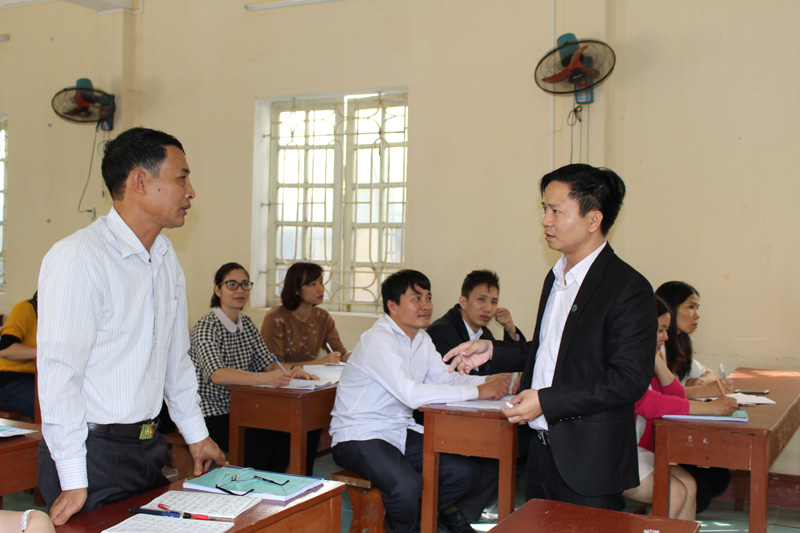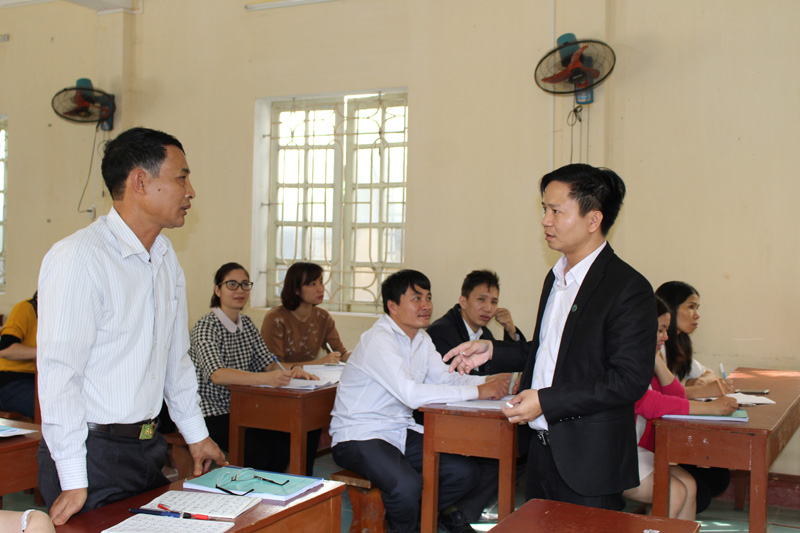
(HBO) - Based on the actual needs of many officials, staff, civil servants and armed force working in ethnic minority area without knowing their languages or understanding their cultural identities of Thai, Mong, Muong ethnics, the effectiveness of their work has been impacted a lot. Therefore, since 2010, the provincial center of continuing education officially opened training classes in Thai and Mong languages. After 7 years, the provincial center of continuing education has opened 19 training courses for about 1,243 learners. This makes an important contribution for the officials and staff to fulfill their tasks well in the ethnic minority areas.
To attract learners, the center has carried out many solutions, such as designing questionnaires and sending them to all the departments, boards and industries, or the media agencies to enroll. At present, the provincial center of continuing education has affiliates with the provincial police department, the department of domestic affairs to regularly open the courses of Thai, Mong language courses. In some districts, the center closely coordinated with the centers of continuing educations of Mai Chau, Da Bac, Lac Thuy districts to open the courses with the most suitable timetables and locations for the learners to join.
Teachers and learners practicing their communications in Thai language in one lesson of Thai language for the intake 16 at the provincial center of continuing education.
Mr. Le Ngoc Hop, the Deputy Head of Board of training and fostering for improving degrees in the provincial continuing education center said: To ensure the training quality, the center has recruited the ethnic minority teachers who have good qualifications, high pedagogy and a lot of experience of teaching. The teaching materials have been issued by the provincial People’s Committees; the syllabus had to be guided carefully by the provincial Department of Education and Training based on the curriculum of the ethic language teaching programme from the Ministry of Education and Training. The time limit for teaching Thai and Mong languages is usually 323 periods, the course includes two sessions: a session of learning the letters and spelling, then learning 9 topics (38 periods) and another session of revisions and getting the certificate (12 periods). At the end of each course, the center organizes for learners to have real practice in the ethnic minority areas of Thai or Mong people so that they can communicate, exchange the customs and culture with ethnic people.
In the school year of 2016-2017, the center has trained and given certificates for 7 courses with 462 learners. Since the beginning of this year, the provincial center of continuing education has opened 4 classes with 365 learners. Talking about the effectiveness of attending an ethnic minority class in the provincial center of continuing education, Mr. Ngo Minh Dan- Vice Head of Advisory Office (Provincial Police Department), the learner of intake 14 of Thai ethnic language, said: For my job requirements of collaborating regularly with the ethnic minority people, I have to understand their language and the cultural identities, I took a course of Thai minority language held by the provincial center. Since then, I have felt confident to communicate and exchange with Thai ethnic people so that I could successfully fulfill my assigned tasks of propaganda and mobilization of ethnic Thai people to strictly observe the law. In the near future, I will register for a Mong and Muong ethnic languages.
The emulation movement "Hoa Binh joining hands to build new-style rural areas” has been widely spreading, becoming a driving force that motivates the localities to renew rural landscapes and improve the material and spiritual lives of the residents. In this movement, the people play a central role-both as the main implementers and direct beneficiaries of its outcomes.
In response to the global digital revolution, Hoa Binh Newspaper is transforming itself into a modern and multi-platform media hub, blending cutting-edge technology with a restructured newsroom and a new generation of tech-savvy journalists.
Hoa Binh province’s Association of the Elderly recently held a conference to review the project on expanding the inter-generation self-help club model until 2025.
In a move to implement Resolution No. 57-NQ/TW, issued on December 22, 2024 by the Politburo, which targets breakthroughs in science-technology development, innovation, and digital transformation, the Hoa Binh provincial Department of Health has issued a plan to roll out the "Digital Literacy for All” campaign within the local health sector.
An Nghia Commune (Lạc Sơn District) is one of the communes that achieved the tha standard of the national new rural area in 2018. Entering a new development phase, the commune is now trying to meet the criteria for the advanced new rural development. With the strong political will and the public consensus, the commune is gradually overcoming the challenges to reach this goal, aiming for the sustainable development.



